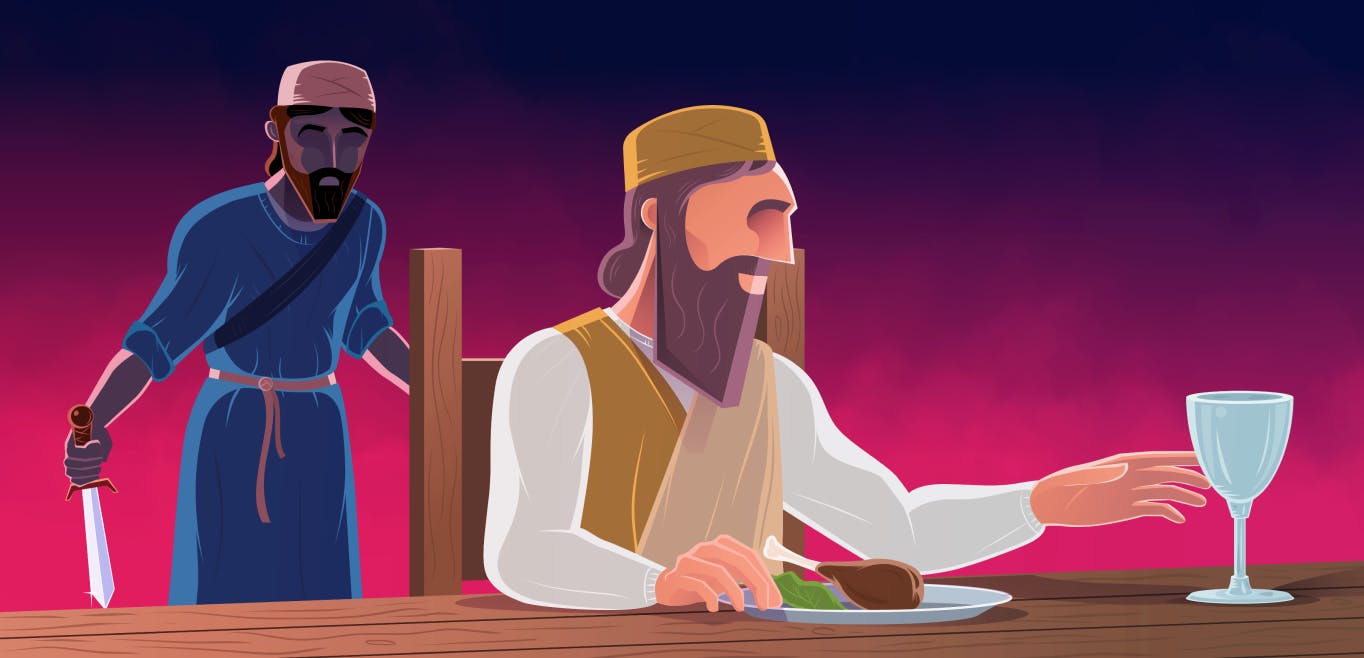The Story Behind Tzom Gedalia
Why We Fast for a Forgotten Leader
BY Arty Cweiber | September 16, 2024 | 5 Minute Read

What is Tzom Gedalia?
After two days of serious prayer, introspection, and apples dipped in honey for a sweet year, many of us are probably still working off those Rosh Hashanah feasts. But just when we’re ready to focus on the final stretch toward Yom Kippur, along comes the fast of Tzom Gedalia.
Wait, what? Gedalia? Who was he again? And why do we fast for him?
Let’s be honest: Tzom Gedalia often gets overshadowed by the “bigger” fasts on the Jewish calendar. It can feel a bit random, and the story seems distant. A leader was assassinated thousands of years ago, and we’re still fasting? Why does this particular tragedy, out of so many in our history, deserve its own national day of mourning? And is there any significance to the fact that it falls on this specific date in the Jewish calendar?
The Historical Context
To understand why we fast on Tzom Gedalia, we might need a bit of a history lesson. After the Babylonians destroyed the First Temple and exiled most of the Jewish population, a small remnant remained in Israel. These survivors were leaderless, traumatized, and unsure of their future. Things were bleak, to say the least.
Enter Gedalia, son of Achikam, who the Babylonian king appointed to govern this small Jewish community. His appointment marked a glimmer of hope. He restored a sense of order, encouraged economic stability, and created a space for Jewish refugees to return home.
For a brief moment, it seemed like the Jewish people might have a second chance at survival. Gedalia’s leadership symbolized resilience, a chance to rebuild after catastrophic loss. But just as things were starting to look up, tragedy struck.
The Assassination of Gedalia
One of Gedalia’s former comrades, Yishmael ben Netanyah, conspired against Gedalia with a plot to kill him.
Yishmael’s motivations for assassinating Gedaliah were likely complex and layered, driven by both personal grievances and larger political machinations. Some commentators suggest that Yishmael, a descendant of the royal line, felt deeply slighted when he was passed over for the governorship of Judea.
Beyond personal motives, Yishmael may have viewed Gedaliah’s optimistic assertion that “all will be well” under Babylonian rule (Jeremiah 40:9) as tantamount to treason. Yishmael's disdain for Babylonian authority was likely intensified by their earlier brutal treatment of the royal family.
Yishmael’s actions were also entangled in broader regional politics. According to Jeremiah, King Baalis of Ammon played a significant role in orchestrating the assassination. Baalis, perhaps seeking to exploit the instability following the Babylonian invasion, saw an opportunity to gain influence or control in the power vacuum. He sent Yishmael to kill Gedaliah, possibly in the hope that chaos in Judea would benefit Ammon.
Yochanan ben Kareach, a former captain of the Judean army, tried to warn Gedalia, first publicly, and then privately, that Yishmael was coming to kill him, but Gedalia refused to believe that a fellow Jew could harbor such treacherous intentions. Gedalia wasn’t just being naïve; he was trying to lead with hope. He wanted to foster trust and unity in a deeply fractured and traumatized community. In his mind, suspecting Yishmael, or any Jew for that matter, of such heinous betrayal would only deepen the divisions among the already fragile Jewish population.
But Yishmael’s hatred ran deep. Determined to carry out his plan, Yishmael and his men arrived at Gedalia’s home in Mitzpah under the guise of friendship. The day? Rosh Hashanah. They shared a holiday meal with Gedalia, appearing to offer peace and camaraderie. It should have been a moment of trust and reconciliation. Yet, as they broke bread, Yishmael and his accomplices murdered Gedalia in cold blood.
His assassination led to the scattering of the Jewish survivors and marked the final nail in the coffin of Jewish self-governance. The remaining Jews fled to Egypt, and for the first time since the days of Joshua, the continuous Jewish presence in the land came to an end.
This event was more than just the loss of one leader—it was the collapse of a fragile rebuilding effort. The assassination of Gedalia represented the end of hope for the Jews left in Israel.
Why We Fast
So, why do we fast on Tzom Gedalia? The fast isn’t just a remembrance of a political assassination; it’s a recognition of what Gedalia’s death symbolizes—the destruction of the last vestiges of Jewish sovereignty in the land of Israel. It’s a day to reflect on the consequences of internal divisions, betrayal, and missed opportunities.
In a way, Tzom Gedalia is an extension of the mourning we do on Tisha B’Av. While Tisha B’Av focuses on the destruction of the Temple and the exile of the Jewish people, Tzom Gedalia zeroes in on the aftermath—the final unraveling of Jewish life in the land after the Babylonian conquest.
But there’s a broader lesson here, too. The tragedy of Gedalia’s assassination reminds us of the dangers of internal discord. Gedalia was killed not by a foreign enemy but by a fellow Jew. Yishmael’s betrayal highlights the damage we can do to ourselves when we allow jealousy, mistrust, and political ambitions to tear us apart from within.
Finding Relevance Today
At first glance, the story of Gedalia may seem like ancient history, but the themes it touches on are all too familiar. We’ve seen throughout history—and it’s especially relevant today—how societies are often weakened more by internal strife than by external threats. When people turn on each other, when trust breaks down, everything falls apart.
Tzom Gedalia is a reminder that the Jewish people, and any community really, are at their strongest when they work together, even in difficult times. And, conversely, we’re at our most vulnerable when we let internal divisions lead to destruction.
It’s no coincidence that Tzom Gedalia comes just days after Rosh Hashanah. Aside from the fact that the assassination of Gedalia took place on Rosh Hashanah, Rosh Hashanah is also a time when we focus on unity and repairing relationships. As we move from the sweetness of Rosh Hashanah to the solemnity of Yom Kippur, Tzom Gedalia calls us to reflect on the role we play in maintaining unity and trust in our own communities.
In "The Hidden Meaning Behind Tzom Gedaliah," Rivky Stern offers us an in-depth look at the story behind this often-overlooked fast, shedding light on its significance and relevance to our lives today.
Dive Deeper
To learn more about upcoming Jewish holidays, check out these Aleph Beta videos:
Rosh Hashanah Preparation: How To Prepare For Rosh Hashanah | Aleph Beta
What Is The Meaning Of Yom Kippur | Aleph Beta
Why Do We Celebrate Sukkot | Aleph Beta
Is Hoshana Rabba the Key to Understanding Sukkot? | Aleph Beta
Commonly Asked Questions about Tzom Gedalia
Who was Gedalia?
Gedaliah ben Achikam was the Jewish governor appointed by the Babylonians over the few remaining Jews in Israelafter the destruction of the First Temple.
What happened on this day in history?
Gedaliah was assassinated by Yishmael ben Netanyah, a fellow Jew, leading to the final collapse of Jewish governance in the land of Israel and the exile of the remaining Jewish community.
Why do we still fast thousands of years after Gedalia’s death?
The murder of Gedalia ben Achikam teaches lessons that still resonate today. It shows how strife and distrust within a community can lead to destruction on a larger scale. Especially in the days between Rosh Hashanah and Yom Kippur, it's a reminder to foster unity and harmony in our families, friendships, and communities.
When is Tzom Gedalia?
Tzom Gedalia falls on the day after Rosh Hashanah (ג׳ תשרי), or the day after that if it conflicts with Shabbat. This year, 5785, Tzom Gedalia falls out on October 6, 2024.
Dive Deeper
Immersing in the mikvah on Erev Yom Kippur carries profound symbolism and spiritual meaning. As we submerge ourselves in the waters, we symbolically return to God's world, seeking purification and renewal as we prepare for the sacred Day of Atonement.
To further explore the deeper meanings of atonement, purification, and the powerful themes of Yom Kippur, take a look at Aleph Beta’s extensive library:
- “Understanding The Day Of Atonement Rituals” — In this video, we dive into the complex, strange, and magical Yom Kippur rituals of old to uncover their significance and explore how they can enhance our understanding of Yom Kippur today.
- “Why Do We Need To Confess Our Sins?” — Teshuvah is a deeply personal process—so how can there be laws for something so emotional? In this 4-part series, we explore how Judaism’s structured approach to repentance offers guidance while allowing for personal transformation.
- “The Meaning Of Hannah’s Prayer” — How do we connect with an infinite God, especially during the High Holidays? Rabbi Fohrman explores the story of Hannah in this 4-part series, whose heartfelt prayer is a model for Jewish prayer. Through Hannah, we discover how God’s greatness makes Him more accessible, and how prayer can bring us closer to Him.
What is Aleph Beta?
Aleph Beta is a unique kind of Torah library. Led by our founder, Rabbi David Fohrman, we are dedicated to high-level, textual Torah learning for adults that is intellectually and spiritually sophisticated, that enlivens your Jewish practice and helps you forge a deeper connection to God. Whether you’ve been learning in yeshiva for years or you’re just beginning your Torah journey, you’re sure to find something meaningful and surprising waiting for you here.
Browse our library of over 1,000 beautifully produced animated videos, podcasts, deep dive courses, and printable guides. Topics include the weekly parsha, Jewish holidays & fast days, laws & mitzvot, prayers, relationships, big philosophical ideas and more. Have something to say at the Shabbos table that will amaze your family and guests and bring deep meaning into their lives.

